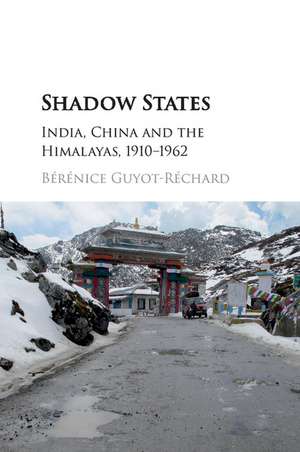Shadow States: India, China and the Himalayas, 1910–1962
Autor Bérénice Guyot-Récharden Limba Engleză Paperback – 7 mar 2018
| Toate formatele și edițiile | Preț | Express |
|---|---|---|
| Paperback (1) | 288.42 lei 6-8 săpt. | |
| Cambridge University Press – 7 mar 2018 | 288.42 lei 6-8 săpt. | |
| Hardback (1) | 698.30 lei 6-8 săpt. | |
| Cambridge University Press – 26 oct 2016 | 698.30 lei 6-8 săpt. |
Preț: 288.42 lei
Nou
Puncte Express: 433
Preț estimativ în valută:
55.19€ • 57.51$ • 45.70£
55.19€ • 57.51$ • 45.70£
Carte tipărită la comandă
Livrare economică 03-17 aprilie
Preluare comenzi: 021 569.72.76
Specificații
ISBN-13: 9781316627242
ISBN-10: 1316627241
Pagini: 347
Ilustrații: 20 b/w illus. 6 maps
Dimensiuni: 152 x 228 x 18 mm
Greutate: 0.47 kg
Editura: Cambridge University Press
Colecția Cambridge University Press
Locul publicării:Cambridge, United Kingdom
ISBN-10: 1316627241
Pagini: 347
Ilustrații: 20 b/w illus. 6 maps
Dimensiuni: 152 x 228 x 18 mm
Greutate: 0.47 kg
Editura: Cambridge University Press
Colecția Cambridge University Press
Locul publicării:Cambridge, United Kingdom
Cuprins
Introduction; Part I. 1910–50: 1. False starts: the first rush towards the eastern Himalayas; 2. The return of the fair-weather state: World War Two and the Himalayas; Part II. 1950–59: 3. Exploration, expansion, consolidation? State power and its limitations; 4. The art of persuasion: development in a border space; Part III. 1959–62: 5. A void screaming to be filled: militarisation and state-society relations; 6. Salt tastes the same in India and China: a different kind of security dilemma; 7. Open war: state-making's dress rehearsal; Conclusion.
Recenzii
'In the eastern Himalayas the imperial ambitions of the world's two most populous states, China and India, have clashed, and mirrored each other, since the nineteenth century. This brilliant, pioneering study goes beyond geopolitics and security concerns to detail how state making actually unfolded in this vast trans-border region (Tibet to the north and the area known to Indians as 'Arunachal Pradesh' and to Chinese as 'South Tibet' to the south). Shadow States is a landmark. Based on meticulous research, it skilfully highlights the agency of Himalayan populations in shaping Sino-Indian relations - and the crucial role that borderlanders play in the formation of states, nations and international relations around the world.' Willem van Schendel, Universiteit van Amsterdam
'We are indebted to Bérénice Guyot-Réchard for providing the first serious history of the resulting India-China border problem … Guyot-Réchard describes in rich detail and with compelling clarity India's northeast border politics, from its imperial origins, before World War I, through its strategic transformation, during the WWII, and through its evolution into a policy of integrative national development, during an extended competition with China over control over the loyalty of Himalayan populations … The great value of this study is its deft interweaving of central state policy making with locally sensible administrative and political activity as they interact with the changing life conditions and intricate decision-making of local residents. This is a rare example of history that brings together a lively evocation of the lived experience of borderland peoples with a sharp empirical analysis of the process by which the mountain borderland became a distinctive iconic formation of national territory.' David Ludden, New York University
'This is a remarkable work of scholarship in a long-neglected area … Unlike other books which have dealt with the high politics of the India-China relationship and boundary, it studies these issues from the ground up, from the point of view of the peoples and society … the result of her considerable scholarship is an important book that covers significant themes in an increasingly important area with a professional historian's care and precision … Do read this book. It is of value well beyond the limited circle of academic readers that the title might attract.' Shivshankar Menon, The Indian Express
'We are indebted to Bérénice Guyot-Réchard for providing the first serious history of the resulting India-China border problem … Guyot-Réchard describes in rich detail and with compelling clarity India's northeast border politics, from its imperial origins, before World War I, through its strategic transformation, during the WWII, and through its evolution into a policy of integrative national development, during an extended competition with China over control over the loyalty of Himalayan populations … The great value of this study is its deft interweaving of central state policy making with locally sensible administrative and political activity as they interact with the changing life conditions and intricate decision-making of local residents. This is a rare example of history that brings together a lively evocation of the lived experience of borderland peoples with a sharp empirical analysis of the process by which the mountain borderland became a distinctive iconic formation of national territory.' David Ludden, New York University
'This is a remarkable work of scholarship in a long-neglected area … Unlike other books which have dealt with the high politics of the India-China relationship and boundary, it studies these issues from the ground up, from the point of view of the peoples and society … the result of her considerable scholarship is an important book that covers significant themes in an increasingly important area with a professional historian's care and precision … Do read this book. It is of value well beyond the limited circle of academic readers that the title might attract.' Shivshankar Menon, The Indian Express
Notă biografică
Descriere
This book explores Sino-Indian tensions from the angle of state-building, showing how they stem from their competition for the Himalayan people's allegiance.













